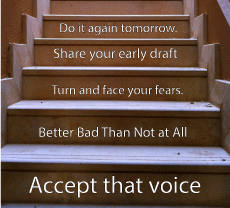 1) Accept that voice. It just means you are doing your work. It doesn’t mean you are doing it badly or wrong, despite the content of the voice. It means you are taking risks, and the part of you that does not like to take risks is protesting. Protecting, even. Ignore me at your own risk, it says. That is exactly what you must do, which leads me to the second step.
1) Accept that voice. It just means you are doing your work. It doesn’t mean you are doing it badly or wrong, despite the content of the voice. It means you are taking risks, and the part of you that does not like to take risks is protesting. Protecting, even. Ignore me at your own risk, it says. That is exactly what you must do, which leads me to the second step.
2) Commit to doing it badly over not doing it at all. Badly is actually the vital first step to doing it well. You are creating the marble out of which you will carve the David. You are building muscle for the marathon. However you want to look at it, you must write a shitty first draft. It must be bad—parts of it, at least—or you are stuck doing what you already know how to do. The definition of creativity involves striking out, trying new things, taking risks. All of these involve making mistakes, getting it wrong, struggling, doing it badly some of the time, even most of the time.
3) Turn and face your fears. Afraid you’ll write badly? Try to write badly. Write the stupidest thing you can. Afraid you’ll wax nostalgic or sentimental if you let yourself go? Do it. Write the weepiest, gushiest mush ball of sentiment you can muster. Afraid you’ll overwrite? Purple your prose the color of bruises and fading sunsets. Afraid you’ll underwrite? Embrace the haiku. Afraid your characters will be stereotypes? Make a wooden idol. Afraid you’ll reveal a truth no one else can handle? Get it onto the page. Afraid you’ll get it wrong? Write down your own lies.
4) Find someone or some context in which you can share your early draft material. There is something so miraculous about creating something out of nothing. We often want to share. But all we want in those early moments is praise—not necessarily praise for the work, not lies, but acknowledgement that we have breeched the dark forest and returned with something. Find a place you can get just that: acknowledgement and the encouragement to keep going.
5) Do it again tomorrow. As with most of these, in order to win yourself a daily writing habit, you must . . . write daily. In order to less the impact of fear and judgment when you turn to your creative practice (because in truth, you won’t overcome them; they are part of the package—see Step 1), you must do it anyway. Regardless of how you feel. Regardless of how yesterday went. Regardless of your mood, the dishes, the family crisis, the million other things that mewl in the corners. You do this. You do it first. You do it badly or well—you will not know and it does not matter. You just write. The rest is not your concern.
How do you deal with your own fears and judgments? What works for you? What’s the best advice you’ve ever heard for this? Have you let fear and judgment stop you? Have you been able to ignore or battle it successfully?
